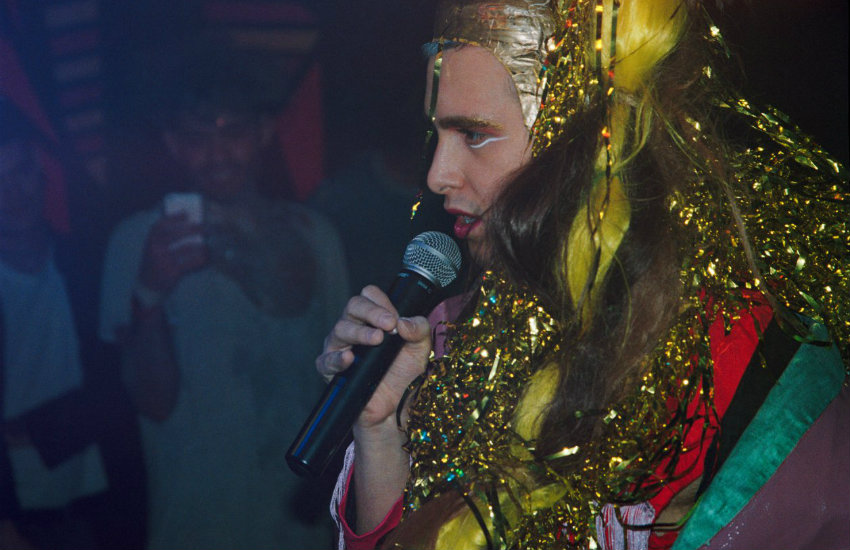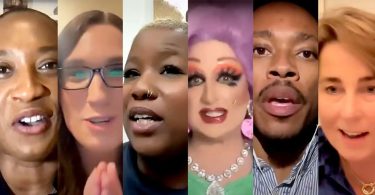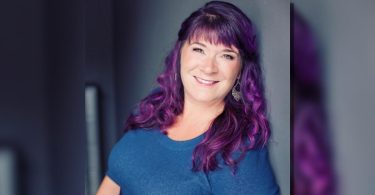Felix, better known by his musical moniker Felix and the Future, isn’t trying to save the world, but that doesn’t stop the way his authenticity inspires.
The artist lives in Brooklyn, New York, with his family and roots in Mexico.
His music is unabashedly him, but the journey to get to this point wasn’t without its bumps.
‘I was told I couldn’t sing,’ he tells GSN.
‘In middle school I was laughed out of choir and I never went back. So I said, “That’s it, I guess I’m never going to become a singer.” For the next couple of years, I studied dance.
‘Then I moved to New York City. I moved there, I sold my computer, and I bought a piano. And I sort of just… sat down and started teaching myself the piano.’
He’s now completely self-taught on the piano. A roommate, who happened to be a classical pianist, gave him a book and taught him some notes. Then Felix practiced day in and day out. Still, others would tell him he needed someone else to sing for him because his voice wasn’t good.
He had one response: ‘Have patience, you’re gonna learn to love my voice.’
[embedded content]
That which lurks in the dark
Felix began making videos, alongside his music, and they became an important creative outlet for him. We end up discovering a mutual love of cinema, and horror specifically. For him, it’s been a life-long love, for me, horror is a relatively new genre I’m braving.
He saw the recent horror film Hereditary and commented on the idea that it was less of a horror movie, and more a story about broken people who don’t know how to communicate until it’s too late. It’s all fascinating to him.
‘My first movie was a horror movie when I was 2,’ he reveals with a laugh.
His love for genre and storytelling extends beyond horror too.
Felix also likes movies that make bold choices. He specifically loves Pedro Almodóvar, who he says puts women front and center in unique ways. And he’s tired of the double-standard of women being sexually objectified by the media, but not men.
‘Growing up Mexican-American can be conservative,’ he says. ‘But so many Mexican artists are also flamboyant and beautiful, and they’ve always influenced me.’
This Mexican culture is a touchstone for him in numerous ways.
‘I was raised a superstitious Mexican-American,’ he responds when I ask him about his video Karen, which has strong religious themes. ‘Living in this fear of everything that lives in the dark.’
[embedded content]
He mentions Cucuy (the Boogeyman), the Devil, the chupacabra, and more mythical creatures.
‘There are endless tales of the dark meant to keep us in line. Religion played a big part, for sure, but folklore and superstition played an even bigger role.’
Pushing truth
Traditional gender roles were something Felix bucked from a young age.
‘When I was a kid, my cousins would come over to my house because I had more Barbies than them. My mom didn’t think it was an issue. But I also knew when I was at school, I couldn’t talk about that.’
Still, he doesn’t go so far to say his family gave him unwavering support.
‘My family is coming around,’ he says. ‘They didn’t suppress me, but they didn’t encourage me.’
Now they understand more and see what he’s doing. Felix shot a music video in Michigan called Drive and he included his cousins.
‘I wanted to include them so they could themselves as non-traditional dark brown people who are beautiful on-screen. They saw so few bodies like theirs in television.’
It’s how he helps better the world, using something as simple as truth and representation.
[embedded content]
Drag queens became an inspiration for him. In New York, he made drag queen friends and performed alongside them.
‘I have to give a lot of gratitude to the drag community, not really for doing anything but being themselves and pushing me.’
They helped him realize there’s no ‘right’ way to be a ‘serious’ musician.
‘I wanted to be taken seriously as a musician, but once I stepped out from behind the piano and let myself be free, I really blossomed. I didn’t realize it when I was younger, but it was self-shame, and I finally let those insecurities go.’
Expression in today’s world
‘It’s impossible for me to just not be myself,’ he says when I ask about showing his queerness in his music.
‘At a Felix and the Future show, it’s my own way of escape. It’s the purest form of who I am. When people come to a show, or watch a video, I hope they feel it themselves. I view it as a place of sanctuary, and a place to make you think, as well.’
Felix and the Future performing | Photo: Provided
As a queer artist of color, he recognizes the very specific time in which he’s creating.
‘I think it would be impossible — I’d have to be living under a rock — to disassociate my music from what’s happening right now,’ he says of the country’s current political state.
‘Pretty much every day more and more of our rights are being infringed upon. Just the other week, Republicans passed an amendment denying LGBTQ families the right to adopt.’
He’s releasing a new album this year — following this year’s Holy Hands Vol. 2 — that he started writing a few months after the presidential election. He describes it as ‘much, much more aggressive and sexual and queer and fiery’.
‘I’ve seen a lot of artists stepping up recently,’ he comments. ‘When there’s nothing more you can lose, you can be freer in a way. And we should get it out before we no longer have that opportunity.’
He believes people who are now speaking up will soon replace those who are afraid to rock the boat.
‘Do I think that people have to use their voice? No. But does it make the world a better place? Absolutely. ‘
So Felix keeps using his voice, and one day the world will listen.







